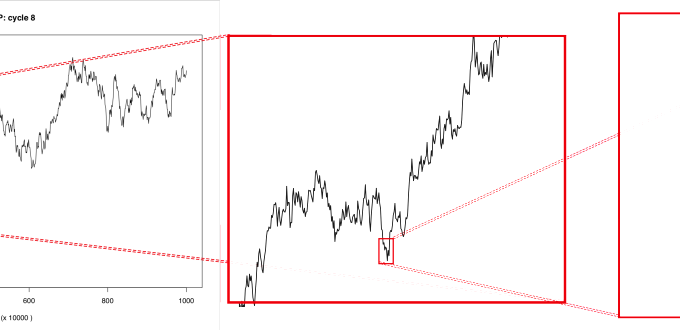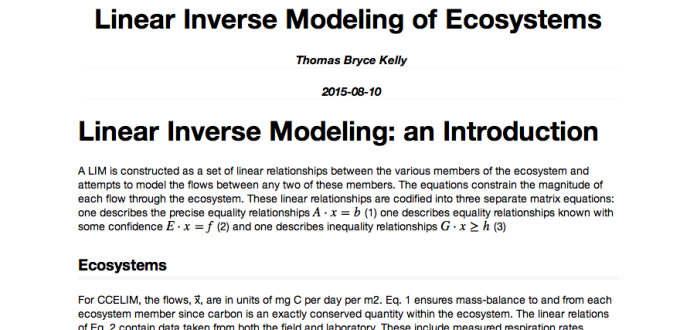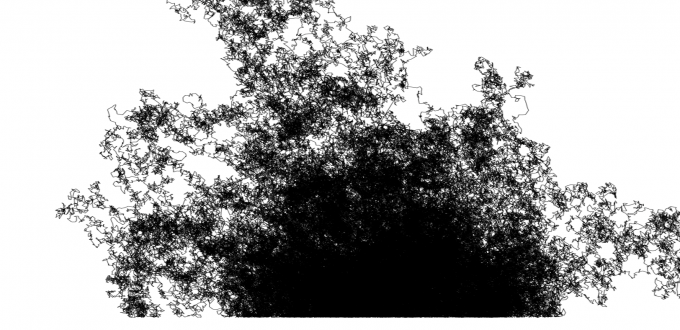On a day to day basis, I use the R programing language more than any other language (e.g Python, Java, Fortran, Matlab…), and there is a good reason for it: R excels at the sort of work I do. It has been extremely well suited to my modeling work, especially when going to analyze the […]
Category: Science
Grassroots Learning: Independent Explorations
Taylor and myself have traditionally spent a fair bit of time outside of lectures and meetings going over material that we find interesting, confusing or useful. Often these topics would push one of us into delving more deeply into the literature or logic of the problem and then sharing the insight and answer with the […]
Markov Chain Monte Carlo: A Practical Introduction
Markov Chain Monte Carlo simulation sounds, admittedly, like a method better left to professional practitioners and the like; but please don’t let the esoteric name fool you. MCMC, as we like to call is, is a powerful yet deceptively simple technique that can be useful in problems ranging throughout science and engineering. Since this promises […]
Finalizing my research, the CCELIM model, in R
For the past 6 months I’ve been working on an inverse modeling project as a ‘starter’ graduate project, and today I am announcing that I can see the light at the end of the tunnel. While there is certainly more work ahead, especially with regards to the manuscript, the model and the code are just […]
Statistical Analysis for my Inverse Modeling
For the past week I’ve been working on a small but important facet of my inverse modeling research: a sensitivity analysis. Since some of the constraints placed on the model are estimated from measured quantities and not really nailed down, we need to be confident that a small change in the measurement wouldn’t make a […]
Philosophy Monday: Heat
From the ancient times of philosophical thought to the advent of the first chemical theories of Becher, heat had been a mysterious concept. It is almost a wonder that something as ubiquitous as heat could be debated, but often daily experience is a poor substitute for real understanding. Although a defining character in differentiating chemistry from […]
Code Walkthrough: Inverse Modeling
In previous articles (here and earlier here) I covered in some cursory way my current research into the California Current and about the technique of Inverse Modeling, so today I wanted to delve into the actual tools and code that I’ve developed. To review, an inverse model is An inverse model seeks to solve a series […]
Philosophy Monday: Lonergan Part 1
The following is a series of short essays based on an assignment I had with Dr Braman at Boston College. Since Lonergan’s philosophy has surely impacted me in ways that I know not of, and since so many people have trouble delving into his work, I thought it most responsible to share the following.
Quantifying Error
Being able to appropriately address uncertainty and error is fundamental to the pursuit of science. Without it, results and theory would never match up since theory usually involves a level of abstraction that permits simplification of the problem and observational results are never perfect and include all sorts of uncertainty. Recently I’ve been trying to […]
Spurious diapycnal mixing in z coordinate models
Introduction Diapycnal mixing is a natural process whereby water parcels of different temperature and/or salinity get mixed. This process, as opposed to advection, is non-adiabatic (non-reversible) and is governed by diffusive mechanisms. The rate of diapycnal mixing is elevated in coastal waters relative to the open ocean and is responsible for the introduction of nutrients […]
End of the Semester
Believe it or not, but it is already the end of the semester for me and my peers. Somehow nearly four months have disappeared once again into that historical accident that we call the past. Since each of my three classes have required a project to be done for the final, I figure that I may […]
Remote Sensing Part 2
In a previous article I described a technique to determine the dye concentration from drone images, and I hope it sounded like a reasonable plan. Nevertheless, this plan did go ary when less than ideal conditions arose and the results got jumbled with the imperfections of the real world. So to make amends, I will […]
Philosophy Monday: Einstein v Newton
The source for the tension between Newton’s view of the universe and of Einstein’s stems from each person’s respective choice of axioms. Newton choose to take the most concrete axioms for his mechanics: absolute nature of space and time. These intuitive assumptions mark and define the whole of Newtonian mechanics since all the other definitions […]
Measuring a dye patch from a drone
While my interests are, admittedly, quite broad, I’ve always been fascinated with signal processing and remote sensing. Just imagine the technological marvel that we can accurately measure the amount of chlorophyll, a grove of marijuana or the amount of snow from a satellite whose travelling 1,000s of miles per hour around our planet. If that’s […]
Working with HYCOM
So far this week I’ve been focusing my energies on getting the Hybrid Coordinate Ocean Model (HYCOM) up and running on my computer. For those of you who don’t know what HYCOM is a modeling platform sponsored by the National Ocean Partnership Program which includes–among others–FSU. Simply put, the HYCOM platform is a powerful ocean-atmospheric […]
Inverse Modeling of the CCE
For the last couple days I’ve been busy working on a presentation and write up for some of the modeling work I’ve been occupied with for the last couple weeks. While nothing crazy, the write-up did allow me to step back a bit from the model itself to see the bigger picture. Having perspective is […]
Philosophy Monday: The Role of Instruments in Science
The use of instruments and tools to understand, measure, and record the natural world may be a staple of modern scientific inquiry, but the relationship between the instruments and their validity in describing the natural world has developed over time. This relationship has changed considerably since the earliest recorders of Greek natural philosophy started over […]
How Twitter Improved my Ecological Model
For a last couple weeks I’ve been working on a marine ecosystem model using a technique called Inverse Modeling[ref]I’ll be sure to do a writeup on what Inverse Modeling is and what makes it interesting in the future.[/ref]; and while there’s been lots of progress, I’m starting to get to the point where the model takes some […]
Philosophy Monday: The Baconian Ideal
Francis Bacon (1561-1626) has been–and will continue to be–an infamous individual in the history of science for he managed to influence countless scientists from numerous generations through his keen understanding of human nature and his tremendous rhetorical skill. First in Novum Organum Scientiarum and later in New Atlantis, Bacon establishes his understanding of science along with a new methodology […]
Computational Fluid Dynamics: Improving FTCS
Today I wanted to share as series of interesting finite difference schema that is much less about the implementation and more about the mathematical underpinnings of the system. This is intended for someone who may be new to finite difference models yet found feel confident with the material I presented last time (Finite Difference Schema). […]
Finite Difference Schema
I want to share with you a step by step guide to how I structured, simulated, and compiled my results for comparing two basic finite difference approximation schema. The system which we will be modeling is given by this differential equation: You are not alone if you are feeling uneasy upon looking at this equation; but […]
Finite Difference Implementation
For my numerical methods course–a course centered around the tools and techniques used in modeling ocean systems–we have been tasked with programing a 1D model of a differential equation with simple initial conditions. Our implementation has to be in Fortran, a computer language with a long history, which has been a bit of a learning […]
Learning R
One aspect of graduate level work that most people are unaware of, yet every graduate student knows, is the tedium of making “publication” quality charts and displays. Figuring out a decent method to show off your data in an elegant figure is essential if you would like your work respected. True, you can always fire […]
Paper of Note: Fast, Minimum Storage Ray-Triangle Intersection
Introduction Raytracing is modern computer graphics technique used to render life-like images for videos and animations. While it’s a relatively modern technique–coinciding with the birth of digital modeling–the inspiration for the methods can be traced back to ancient Greece. While some Greeks truly believed that our eye’s emit the ability to see and not that our […]
If I were a farmer…
While checking out the latest headlines and otherwise perusing the PLOSONE site in search of some new and interesting research, I came across a meta-analysis that sounded interesting. With the provocative title of ‘A Meta-Analysis of the Impacts of Genetically Modified Crops’ [ref]Klumper and Qaim, A Meta-Analysis of the Impacts of Genetically Modified Crops. PLoS ONE 9(11): […]
Paper of Note: Chirality from Achiral Reactants
Introduction Chirality, or the handedness, of chemical compounds is an intrinsic property of many chemical compounds, especially those of interest to biology. While anyone familiar with biology will know that amino acids–the building blocks of proteins–are enantiomerically pure, it remains a lingering question of how it became this way. Nature generally proceeds forward without favoring […]
Paper of Note: Many Interacting Worlds Theory
While mulling around yesterday before the Thankgsiving festivities, I decided to print off a new paper out in Physical Review X about a novel quantum interpretation and formulation [ref]Quantum Phenomena Modeled by Interactions between Many Classical Worlds. Phys. Rev. X 4, 041013 – Published 23 October 2014 Michael J. W. Hall, Dirk-André Deckert, and Howard M. Wiseman […]
Paper2Plastic
Over this past summer a new initiative in the Boston College chemistry department had its first year: year 0. This program, titled Paper2Plastic, is our response to the under-representation of women and minorities in the STEM fields. By introducing the students to the conditions of a research lab early in their educational careers (i.e. high […]
Information Theory
Imagine you are standing, waiting for the T. Off the side of the tunnel you see that glimmer of not the T’s headlight, but rather the glimmer of the reflection of the T’s headlight as it snakes its way through the labyrinth on underground tunnels. The T dashes into view, and it would be surprising […]
Science Classification
Today I was exposed to a novel idea that I thought I would share. The idea comes from a paper that came up as part of a reading group I’m in which is delving into the recent philosophy of chemistry material. The article was a chapter from “Professionalism and Ethics in Chemistry” by Jeffrey Kovac (Amazon) wherein […]








